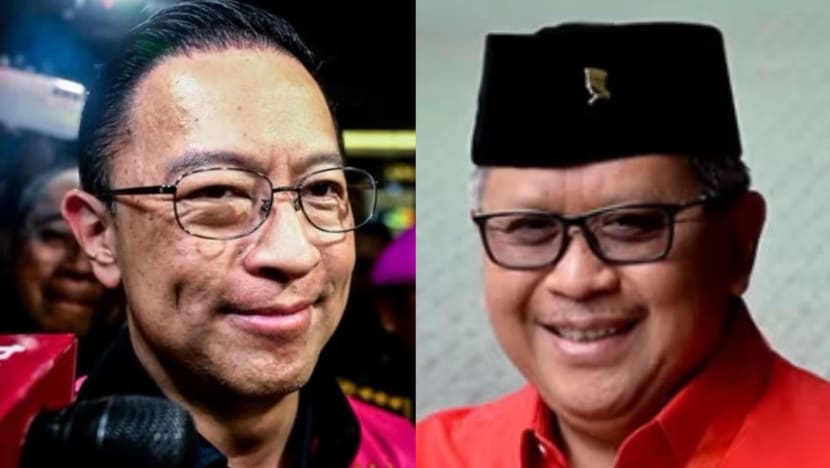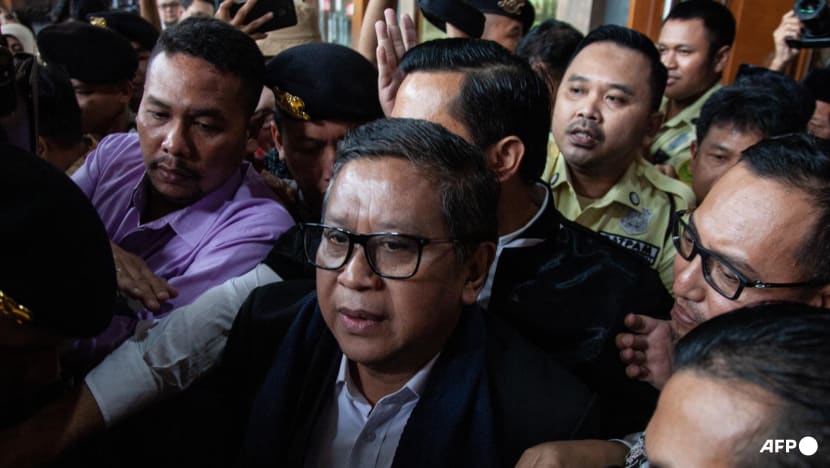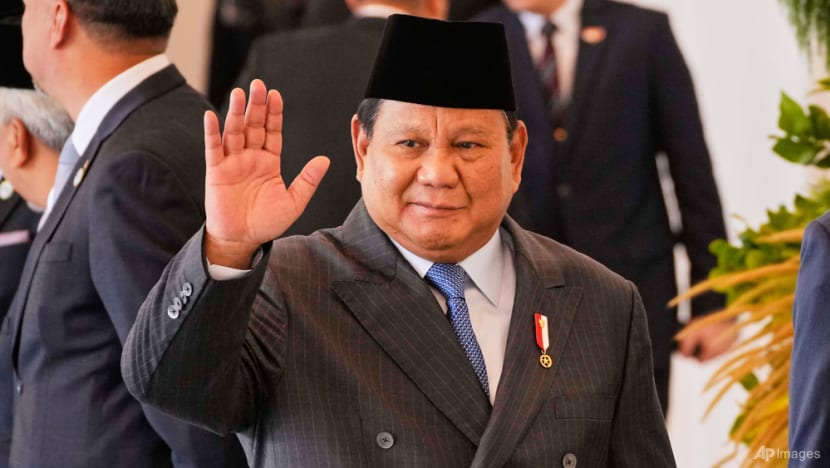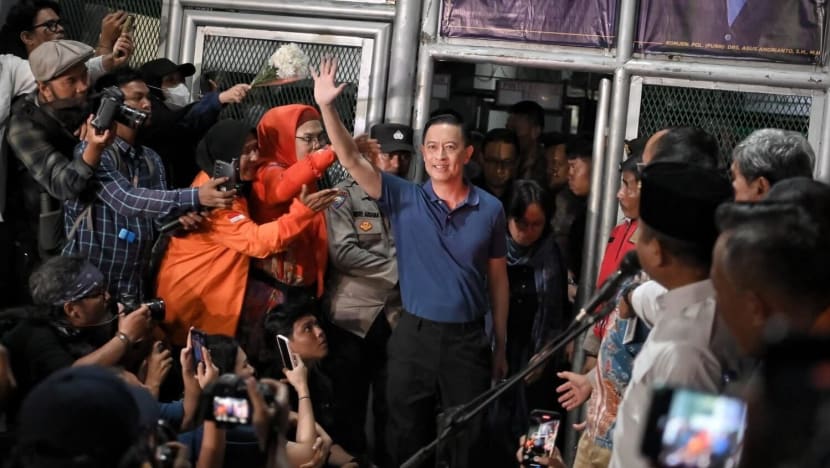analysis Asia
Prabowo’s landmark pardon of 2 rivals for graft ‘purely political’, but casts doubt on corruption fight
The controversial pardons of a former trade minister and a politician from a rival party – the first granted to corruption convicts – have ignited debate about political motivations and the future of graft enforcement in Indonesia.

Former Indonesian trade minister Thomas Lembong (left) and Indonesian Democratic Party of Struggle politician Hasto Kristiyanto (right). (Photos: Reuters/Antara Foto/Rivan Awal Lingga, CNA/Danang Wisanggeni)

This audio is generated by an AI tool.
JAKARTA: Indonesia President Prabowo Subianto’s decision to pardon two political rivals convicted of corruption could be a double-edged sword, with experts saying it calls into question the president’s credibility and commitment to combat entrenched graft in the country.
Last Friday (Aug 1), Prabowo pardoned former trade minister Thomas Lembong and senior politician Hasto Kristiyanto, just days after the two were convicted in separate cases of corruption.
It was the first time in Indonesian history that pardons were given to corruption convicts.
That both men are opposition figures also made political watchers sit up.
Thomas was the campaign manager of Prabowo’s rival Anies Baswedan in last year’s presidential election. Hasto, meanwhile, is a stalwart of the Indonesian Democratic Party of Struggle (PDI-P), which backed another candidate Ganjar Pranowo.
When Thomas and Hasto were charged, some in the opposition camp believed the charges were trumped up.
Now, the pardons are a “big political move which can open up communications (between Prabowo’s administration) and PDI-P as well as the people around Tom Lembong”, Hendri Satrio, a political expert from Paramadina University, told CNA.
“Prabowo is trying to say: ‘Let’s sit down together’.”
Justice Minister Supratman Andi Agtas admitted as much during a press conference last Friday when he said Thomas and Hasto’s pardons were given in “the spirit of reconciliation”.
Experts lambasted the move, saying that it undermines the country’s efforts against corruption, which is costing Indonesia billions of dollars every year.
Thomas was sentenced to 4.5 years in jail on Jul 18 for improperly granting sugar import permits in 2015 during his term as trade minister. Authorities said his decision caused nearly 600 billion rupiah (US$36.64 million) in state losses.
Meanwhile, Hasto was sentenced to 3.5 years’ jail on Jul 25 for his role in the bribery of an election official in 2019. The S$57,530 (US$44,962) bribe was given in exchange for a parliamentary seat for a fellow PDI-P politician, Harun Masiku, who is now a fugitive.
Thomas received a full pardon, better known as "abolisi" in Indonesia, which means that his conviction was overturned and is considered innocent.
Hasto was given an "amnesti", which means he is still considered guilty but does not have to serve any jail term. Although Hasto can still lodge an appeal if he wishes to clear his name, the seven-day window for him to do so lapsed on Aug 1.

A BLOW TO INDONESIA’S GRAFT FIGHT?
Experts said that other than political gain, there is no good reason for Prabowo to grant the pardons.
Even before he became president, Prabowo had repeatedly promised to put corrupt officials behind bars and put an end to widespread corruption.
“We have tremendous wealth, but there are too many thieves stealing people’s money,” he said at a Jun 2 event to commemorate the birth of the state ideology Pancasila.
“I am determined to put an end to all this.”
By granting clemency to Thomas and Hasto, Prabowo is sending mixed messages about his anti-graft commitment, observers said.
“Throughout history, no corruption convict has ever received amnesty or abolition,” Yassar Aulia, a researcher from the non-for-profit group Indonesia Corruption Watch told BBC Indonesia.
Yassar said the government should have allowed Thomas and Hasto to appeal the decisions by the lower courts to clear their names.
The activist noted that there are many court testimonies from both cases which could be explored further by the higher courts and law enforcers, which could lead to more charges and convictions.
“Instead, (the government) intervened and these cases are considered closed,” he said.
Feri Amsari, a law expert from Andalas University, agreed.
“Historically (in Indonesia), amnesty and abolitions were given to political prisoners because of regime changes, or provided on humanitarian grounds to petty criminals. This time is different. It is purely political,” Feri told CNA.
“This is a bad precedent. In the future, all corrupt officials may be given clemency if it suits the political interests of those in power.”
Thomas's lawyers on Monday (Aug 4) announced they are launching a formal complaint against the three judges who heard his case, saying they acted unprofessionally and were biased.
"There was one judge whom we think did not put forth the presumption of innocence principle throughout the trial proceedings. Tom was treated as if he was already guilty and (the trial) is just for looking the evidence," said Lembong's lawyer, Zaid Mushafi, as quoted by Detik news portal.
"We want an evaluation so that this (treatment) will never happen again to anyone else in the future."
The complaint was made to the Supreme Court and the Judiciary Oversight Commission.
POLITICAL UNDERTONES AND PUBLIC SUPPORT
It is worth noting that when criminal charges were initially brought against Thomas and Hasto, they were widely criticised as trumped up and political, particularly since both men were charged just weeks after Prabowo was sworn in as the country’s eight president last October.
“These cases sparked quite strong public backlash with some people fiercely criticising the government,” said Adi Prayitno, a political expert from Syarif Hidayatullah State Islamic University.
Thomas and Hasto also attracted public sympathy, particularly after their conviction.
Prabowo, therefore, “might be trying to quell the backlash and stop it from further hurting support for the government”, Adi added.

The pardons came just one day before the PDI-P held its national congress in Bali, where chairwoman Megawati Sukarnoputri stated her party will support “all government policies which benefit the many”.
Megawati also insisted that the PDI-P “does not position itself as an opposition”, preferring instead to view its role as “a counter-balance party”.
A teary-eyed Megawati welcomed Hasto when he appeared at the congress in the middle of her speech.
“I have been praying but I wasn’t sure that Hasto would ever be among us once more. God has given us what (Hasto) has always wanted. Truth will prevail,” she said to the thunderous applause of party cadres.
Prabowo’s former rival Anies has also expressed his gratitude for Thomas’ pardon.
“This is a happy moment for Tom Lembong’s family, who have been apart for nine months and three days,” Anies said on the day of Thomas’s release, as quoted by Kompas news portal.
“We would like to convey our appreciation to President Prabowo, who recommended the abolition, and to the House of Representatives for approving the abolition.”

But Anies stopped short of saying whether he would remain critical of Prabowo’s administration or follow PDI-P in supporting the president’s policies, political expert Adi noted.
Currently without a political party, Anies, a former governor of Jakarta, is largely supported by a loose network of individuals who are dissatisfied with the government.
“It takes more than the abolition of a legal case to convince these people to end their critical stance,” Adi said.
Indonesian social media users are split on the issue, with some praising Prabowo's move.
"By giving amnesty and abolition, President Prabowo showed that power can be used to bring peace and not disharmony, to heal instead of harm," a user called Gadis Berjilbabb wrote on X.
Others called it “a win for corruptors” and “just another political manoeuvre” by those in power.
“Prabowo started this whole sham and now he gets to act like he’s the hero by ending it,” Yudi Wibowo wrote on the same platform.


















